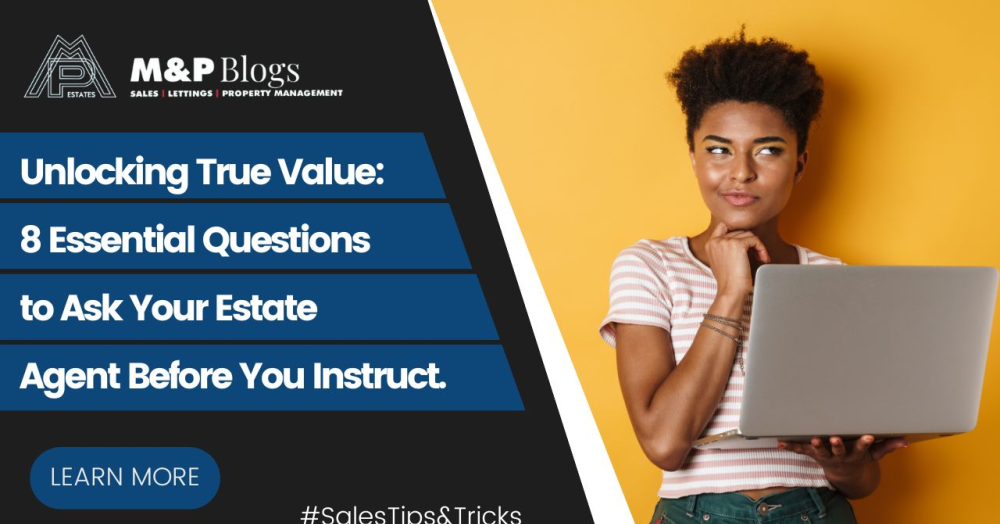Before engaging an estate agent, mastering your property valuation is essential. Asking the right questions—about comparable sales, pricing strategy, and market conditions—will ensure you make informed decisions. This guide equips you with key questions to ask before instructing an agent.
1. How Did You Arrive at the Valuation?
An accurate valuation stems from a thorough analysis of recent, comparable sales in your area. Ask the agent:
- Which local properties have you used as benchmarks? Ensure they're similar in size, condition, tenure (freehold/leasehold), and location.
- When did these properties sell? Ideally, within the last 3–6 months, to reflect current market conditions.
- What differences exist between those properties and mine? Adjustments in valuation should account for extensions, renovations, or garden size.
A transparent approach here demonstrates the agent’s market knowledge and analytical rigour.
2. What Market Trends Are You Observing?
Your agent should bring insight beyond basic comparables:
- Are prices rising, stable, or declining in our area? Understanding the trend affects both timing and pricing strategy.
- How long are properties staying on the market? Short times indicate demand and negotiation leverage; longer times suggest market softness.
- Which type of buyers is active—first-time buyers, upsizers, investors? Different buyer profiles value features differently.
An agent who monitors and communicates these trends is likely tuned into your area's market pulse.
3. What Strategy Would You Recommend?
Valuation is one thing; selling strategy is another. Ask:
- What asking price would you set, and why? Get a clear rationale.
- Would you price slightly under to create a sense of urgency, or above market to allow negotiation? Both show different selling philosophies.
- How flexible is the strategy? Understand how often and under what conditions they’d recommend a price review.
A deliberate and flexible strategy tailored to your property is key to capturing the right buyer.
4. How Do You Market Properties Like Mine?
A valuation isn’t successful without smart marketing. Explore:
- Which online portals and local marketing channels will you use? Visibility on Rightmove, Zoopla, and local networks is crucial
- Do you offer professional photography, floorplans, or virtual tours? High-quality visuals boost buyer engagement.
- Will you tailor marketing materials to specific buyer types? For example, position amenities differently for families versus young professionals.
The more targeted and high-quality the campaign, the more value your valuation holds.
5. How Many Valuations Have You Done Recently?
This gauges both credibility and experience:
- How many valuations have you completed in the past 3 months? A higher number suggests active market involvement.
- Of those, how many were market appraisals vs. agent-led estate valuations? Both offer insight, but local market experience is key.
- What was the average sale-to-listing ratio? Ideally, properties sell close to or above asking price.
Track record builds trust that the valuation is grounded in real-world success.
6. What Are the Likely Costs and Fees?
Valuation isn’t just price—it’s net proceeds.
- What are your estate agent fees? Confirm if they’re percentage-based or flat-rate and whether they're negotiable.
- Are there extra costs for marketing, photography, or virtual tours? Some services are optional extras.
- How much should I budget for legal fees, EPC, conveyancing? Get ballpark figures to avoid budget surprises.
Understanding total costs ensures your valuation aligns with realistic take-home proceeds.
7. What Could Impact the Valuation Positively or Negatively?
Some factors lie outside standard comparables:
- Planning applications nearby? Future developments can enhance or suppress value.
- Local infrastructure changes? New transport links, schools, or shops can boost interest.
- Seasonality or economic conditions? Market warmth or cold spells can shift pricing expectations.
An agent who flags these shows a broader perspective beyond square footage.
8. How Will You Keep Me Informed?
Effective communication supports the valuation:
- How often will I receive updates? Weekly check-ins or portal reviews?
- What reporting format do you use? Clear, concise feedback is essential.
- How is buyer interest measured—viewing feedback, portal analytics? This tells you if the valuation resonates.
Proactive communication maintains momentum and avoids surprises.
Final Thoughts
Valuation is about far more than a number—it’s the foundation of your entire sales strategy. By asking a targeted set of questions, you're not only confirming the agent’s credibility but shaping how effectively they market and sell your home. If you're a local property expert like me, or guiding others through the sale process, a well-constructed valuation conversation leads to confident decisions and optimal results.


